
Hemp's Paradoxical Regulation: The Most Watched Sector in Cannabis
With the rapid growth of the hemp market, many have labeled it a "wild west" of sorts within the cannabis industry. However, contrary to popular belief, the hemp market is actually one of the most regulated sectors. This blog post dives into the complexities of hemp regulation, dispels common misconceptions, and provides insights into the future of this fascinating industry.
The Rise of Hemp in the Cannabis Market
The cannabis industry has seen exponential growth over recent years, with hemp emerging as a key player. This versatile plant, known for its numerous applications, from textiles to wellness products, has captured the attention of health enthusiasts, cannabis advocates, and wellness consumers alike. Hemp's rapid ascent in popularity can be attributed to the growing awareness of its benefits and the increasing demand for sustainable alternatives in various industries.
Hemp stands out in the cannabis market due to its unique legal status and diverse range of applications. Unlike marijuana, hemp contains low levels of THC, the psychoactive compound responsible for the psychoactive properties associated with cannabis. This distinction has paved the way for hemp-derived products like CBD to enter the mainstream, offering an array of wellness benefits without the intoxicating effects.
Despite the surge in interest and demand, the hemp industry faces challenges rooted in misconceptions about its regulatory landscape. Many assume that the hemp market operates with minimal oversight, but in reality, it is subject to a complex web of regulations that rival those of other cannabis products.
Understanding Hemp Regulation
One of the most significant milestones in the regulation of hemp was the passage of the 2018 Farm Bill. This landmark legislation removed hemp from the list of controlled substances, effectively legalizing its cultivation and production across the United States. The Farm Bill established a clear legal framework for hemp, distinguishing it from marijuana and setting the stage for its integration into various industries.
The legal status of hemp and its derivatives, including CBD, is nuanced. While the Farm Bill legalized hemp at the federal level, individual states retain the authority to regulate its cultivation, processing, and sale. This dual-layered regulatory approach has led to a patchwork of rules and requirements, with some states imposing stricter guidelines than others.
Federal and state agencies play a crucial role in regulating the hemp market. The U.S. Department of Agriculture (USDA) oversees hemp cultivation, ensuring that growers comply with THC limits and other requirements. The Food and Drug Administration (FDA), on the other hand, monitors the safety and labeling of hemp-derived products, particularly those intended for human consumption.
Challenges and Misconceptions
Despite the regulatory framework established by the Farm Bill, misconceptions about the "unregulated" nature of the hemp market persist. Many assume that hemp businesses operate with little oversight, leading to concerns about product safety and quality. This misconception stems from the complexity of hemp regulations and the varying degrees of enforcement at the state level.
Hemp businesses face numerous challenges in navigating the intricate regulatory landscape. Compliance with testing requirements, licensing procedures, and labeling standards can be daunting, particularly for small enterprises. The lack of uniformity in regulations across states adds another layer of complexity, forcing businesses to adapt to different rules depending on their location.
These challenges highlight the need for greater clarity and consistency in hemp regulations. A unified regulatory framework would not only streamline business operations but also enhance consumer confidence in hemp-derived products.
The Most Regulated Sector in Cannabis
Contrary to the notion of being unregulated, the hemp market is arguably the most scrutinized sector in the cannabis industry. Compared to marijuana, whose legalization varies significantly across states, hemp is subject to stringent testing and compliance requirements at both federal and state levels.
Hemp cultivation and production are governed by strict guidelines that dictate everything from THC content to pesticide usage. Growers must adhere to rigorous testing protocols to ensure their crops remain within legal THC limits, and any deviation can result in severe penalties.
The emphasis on testing and safety standards extends to hemp-derived products as well. Manufacturers must provide detailed information on product labels, including ingredients, dosage, and potential allergens. This level of transparency is essential for building consumer trust and ensuring the safety of hemp products in the market.
The Future of Hemp Regulation
Looking ahead, the regulatory landscape for hemp is poised to evolve further. With the growing acceptance of hemp-derived products and the increasing demand for natural alternatives, policymakers are likely to revisit and refine existing regulations to accommodate industry developments.
Global regulatory changes could also impact the hemp market significantly. Countries around the world are exploring hemp as a sustainable resource, and international collaborations may lead to harmonized standards and best practices.
The continued evolution of hemp regulation presents opportunities for businesses to innovate and expand their offerings. By staying informed and adapting to regulatory shifts, hemp businesses can thrive in a dynamic market while contributing to its sustainable growth.
Conclusion
In conclusion, the hemp market, often perceived as unregulated, stands as one of the most carefully monitored sectors within the cannabis industry. The 2018 Farm Bill and subsequent regulations have laid the foundation for a thriving hemp market, albeit one characterized by complexity and challenges. Despite common misconceptions, hemp businesses operate under stringent guidelines, ensuring product safety and quality.
As the hemp industry continues to evolve, stakeholders must advocate for responsible and sustainable practices. By supporting initiatives that promote education and compliance, we can foster a robust hemp market that benefits consumers and businesses alike.
For those interested in navigating the intricate world of hemp regulation, partnering with organizations like the Florida Healthy Alternatives Association (FHAA) can provide valuable insights and resources. Together, we can shape a future where hemp plays a pivotal role in promoting wellness and sustainability.
Stay informed and engaged with the latest developments in hemp regulation to make informed decisions and contribute to a thriving and responsible hemp industry.




